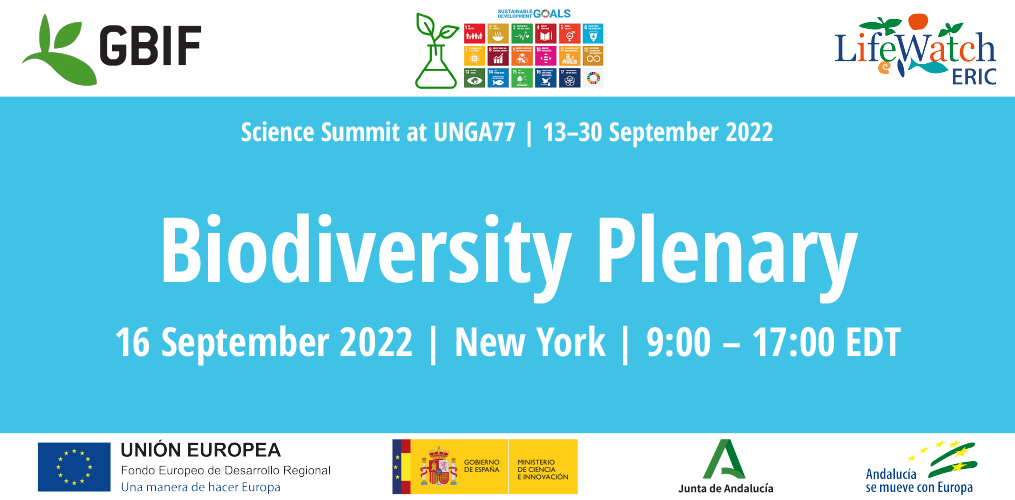
On Friday 16 September, LifeWatch ERIC and GBIF, the Global Biodiversity Information Facility, will organise a Biodiversity Plenary at the United Nations General Assembly (UNGA) Science Summit in New York, which is taking place from 13 – 30 September to mark the 77th General Assembly of the UN. Together, they will present collaborative research systems and examples of innovative digital technologies to meet the challenge set by the SDGs to preserve ecosystems –specifically SDG 14 Life below Water and SDG 15 Life on Land– encouraging better informed decision-making that is firmly rooted in science. Their complementary experiences will be offered both to the national delegations in the General Assembly and to the international community, in order to increase understanding about the resources, procedures and examples of effective interventions that can halt biodiversity loss in the context of climate change – in fact, 40 speakers will participate: representatives and experts from world organisations such as the UN; regional institutions such as the European Commission; and directors of scientific centres and research consortia from all corners of the planet. In particular, the Biodiversity Plenary will call for special attention towards the contribution of agroecology to sustainable agriculture and biodiversity, also drawing on the knowledge of indigenous communities, and will contribute to the preparation of the 2023 UN Summit of the Future, which has the purpose of forging a great consensus in the face of global challenges.
The Plenary on Friday 16 September is one of the four Plenary Sessions of a programme that lasts over 18 days and includes more than 100 events, to examine the role of scientific research and cooperation in achieving the UN SDGs for 2030. It will be broadcast live on the UNGA Science Summit website. During the event, LifeWatch ERIC aims– both through the Biodiversity Plenary and the numerous meetings that it will hold in New York with authorities, diplomats, scientists, conservationists, administrators of resources and social agents– to create awareness of the 2030 Agenda.
Biodiversity Plenary Programme
The hybrid Plenary, taking place on Friday 16 September in New York from 09:00 – 17:00 EDT, will be opened with contributions from representatives of supranational organisations, including European Commissioners, representatives from UNESCO, and national ministers.
It is split into two sessions; the first focuses on the growing importance of networked research infrastructures, with the data, services and resources that essentially provide the backbone for fundamental and applied science, and the definition of evidence-based policies. It will begin with the panel ‘Scientific Setting: How biodiversity is crucial to delivering UN’s SDGs and what has to happen now’. This will be followed by the panel entitled ‘Biodiversity Data: support for global policy optimisation’.
The second session, ‘Biodiversity Case Studies: Accessing global datasets and using new other forms of technology-enabled evidence to inform policy-making’, is focused on case studies of biodiversity that demonstrate the qualitative leap that access to global data sets brings, using new technologies as a way to broaden scientific evidence, which improves the orientation of policy to manage, preserve or recover ecosystems.
You can find more detailed information regarding speakers on the UNGA Science Summit website.